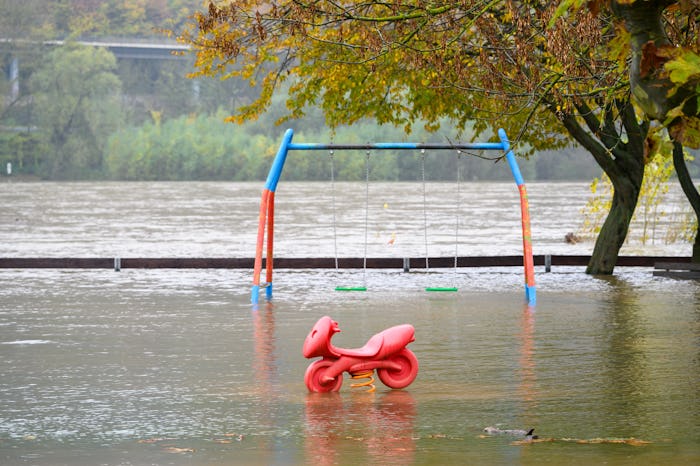Parenting

This Small Vocabulary Swap Will Change The Way You Think About Climate Change
These disasters are unnatural.
The signs of climate change are all around us. Heatwaves are longer, hotter, and more frequent. More of our rain comes in the form of torrential downpours that can lead to flooding. Hurricanes are stronger, intensify more rapidly, and come with heavier rains. Wildfires burn larger areas and their season is longer than ever before.
Today, the earth is warming up to 50 times faster than it has previously. And as these unnatural disasters become more frequent, they’ll also hit closer to home. Whether it’s your family’s favorite summer camping site or that dream vacation spot you wanted to visit, it’s not hard to see: we’re losing some of the most beautiful places on earth.
With over 99 percent of experts agreeing on the basic facts of climate change — one: that it is real, two: it’s human-caused, and three: it’s harming people now — there’s never been a more pivotal time to be moved to action. Science Moms, a nonpartisan, fact-checked source for learning about climate action, has a few ideas on how to help you do that. The simplest one? Start calling them unnatural disasters.
Burning fossil fuels is a key contributor to the rise in the earth’s unnatural weather conditions. In fact, a more apt (and honestly, much more impactful) way to reframe these events would be to call them “unnatural disasters.”
When we do this, it’s easier to take accountability for the part we play in climate change, and in turn, become empowered to do something about it. In your home, the changes you make can be as simple as getting a free or low-cost professional energy audit to help you reduce energy use (and costs) or drying a few loads of laundry the old-fashioned way. There are also new incentives and tax credits that make clean energy swaps at home more affordable and accessible.
Community work is also a great way to shift the narrative around unnatural disasters on a larger scale. Local climate change groups come together to amplify concerns to public officials, pushing them to make better decisions for the future of our children.
If you ever feel overwhelmed, remember there’s strength in numbers — and that means inviting your friends and family to join you, because the places they love are at risk, too. An easy entry point for starting the convo with them can be as simple as sharing informative yet entertaining videos like these in the group chat.
To usher the shift to a more environmentally responsible future, it’s never too early to involve your children so they understand what’s at risk. And it doesn’t have to be intimidating; books like Counting on the Planet and Nature’s Best Hope: How You Can Save The World In Your Own Yard puts climate change in terms they can understand while teaching them to have an appreciation for the planet.
The truth is that the current state of climate change isn’t something that has to keep getting worse. How much sea levels rise, how bad hurricanes get, or how many people are forced to flee their homes will depend on taking action to stop heat trapping pollution from burning fossil fuels.
And if these unnatural disasters are exacerbated by man-made actions, the power lies with us to do something about it. And doing something about it, from small swaps at home to writing letters to local leaders, is how you can ensure your children will be able to make lasting memories the same way (and same places!) you were able to when you were growing up.